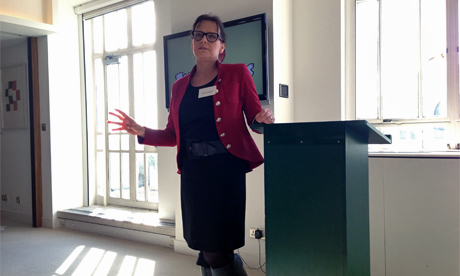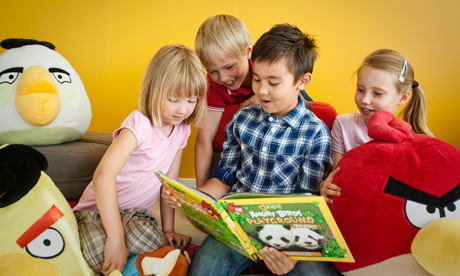Michael Gove may not approve, but Finnish firm says its new educational programme is 'trying to do something meaningful and good with these characters'
The words of education secretary Michael Gove earlier this year, in a speech that took a further potshot at the thought of children who "while away hours flinging electronic fowl at virtual pigs".
Perhaps he's more of a Candy Crush Saga man. Unsurprisingly, there was no role for Angry Birds in Gove's plans to reform the UK's national curriculum, but his comments were disappointing for two reasons.
First: for the assumption that playing a popular game and learning to code were mutually exclusive activities, and ignoring the possibility that the former could lead to the latter, with the right resources and encouragement.
Second: what Gove's speechwriters thought was a witty rhetorical jab at an easy scapegoat belied a lack of awareness of the educational ambitions of Rovio, the company behind Angry Birds, which have been public for some time.
The company has worked with the likes of National Geographic, NASA and the European Organization for Nuclear Research (CERN) on science-related books and educational materials around past Angry Birds games, but now it's launching something more ambitious called Angry Birds Playground.
Developed in partnership with the University of Helsinki and based on the Finnish national curriculum, it's an educational programme covering maths, science, music, language, arts and crafts, physical education and social interaction.
Aimed at children around "kindergarten" age in Finland – around six years old – the programme's materials will include books, posters, game cards, a five-string instrument and physical games as well as digital content.
The programme was unveiled in China last week, where it will be launching first in a Shanghai early-learning centre.
"It's not just games we're talking about here: it's a full 360-degree approach to learning, where games are just one part of it. It's not learning by sitting down and playing with a digital device," says Sanna Lukander, Rovio's vice president of learning and book publishing.
"There's a real substance to it, and a healthy balance between rest, play and work. We feel it's necessary to talk about healthy nutrition and physical exercise, as part of this approach to learning, balance and wellbeing."
The University of Helsinki will remain involved with Angry Birds Playground, training teachers to use the programme, incorporating their feedback into future versions of it, and researching how effective it is.
It's about more than just exporting Angry Birds in educational clothes, then: this is about Finland exporting its educational philosophy and expertise, and using a popular brand to do it.
"We're not just putting a sticker on something, We're combining two brands. One is Angry Birds with its global reach and people recognising the characters and being motivated to learn more," says Lukander.
"But the other brand is a long legacy of work done in Finland by educational experts, and beautiful co-operation between the authorities, schools and book publishers."
She also stresses that digital games are just one element of Angry Birds Playground, with board games, sports and physical activities taking a high priority alongside elements that even a traditionalist education secretary might appreciate.
"We are studying the formats of the content carefully. We certainly believe a traditional book is good for certain parts, and also that it's important for children to use pen and paper," says Lukander.
"We also want the children to start learning about music through composing themselves, so we have the five-string instrument. It's a real instrument, not a toy. We already see them enjoying the feeling that they can accomplish something, and of music as something composed by people."
Digital elements will range from games and mobile content through to collaborative activities designed for interactive whiteboards in classrooms.

"What's most interesting is to promote the very open and wonderful dialogue that the Finnish authorities have with schools and textbook publishers," says Lukander.
"There are countries where the authorities take the decisions and let people in schools know how things should be run, but here we have an open dialogue, and work on the national curriculum together."
Meanwhile, Rovio will continue the other side of its book publishing business, working with partners like National Geographic on Angry Birds books that include educational content.
That company is releasing a new "Science Behind the Saga" book this week, for example, tying in with the release of Rovio's Angry Birds Star Wars II game for smartphones and tablets.
"I love the Society and working with their books department: they really know how to tell stories with a twist that engages children," says Lukander, emphasising again that Rovio's books business is more than a licensing cash-in.
That is the key point about something like Angry Birds Playground, though: the fact that however serious its educational intent is, the programme is also promoting a series of paid games and its hundreds of commercial spin-offs.
I suspect it will be a divisive issue for parents and teachers alike: some seeing it as unacceptable commerce in the classroom, and others seeing it as a pragmatic attempt to use children's favourite characters to help them learn as well as play.
Is Rovio concerned about Angry Birds Playground being seen as just another way to sell the Angry Birds brand?
"It's definitely something that has to be discussed, because that's not how I see it. I see the characters as engaging and motivating, because I work on the publishing side," says Lukander.
"We have authors writing beautiful stories about these characters and their world. I see them as literature. And some characters that are born from literature may also have some commercial aspects attached to them later on. I don't see that as any kind of threat."
She points to Harry Potter and – in Finland – the Moomins as existing examples of popular literary characters being used in schools to get children reading stories, and talking about some of the issues they raise.
"I could understand the concern if people thought we had the wrong people working on education content, but we have educational specialists working on this," says Lukander.
"This is not a licensing thing, and Rovio is not a games company any more. It's a media company, and like many other media companies, it has an educational arm. We're trying to do something meaningful and good with these characters."

ไม่มีความคิดเห็น:
แสดงความคิดเห็น